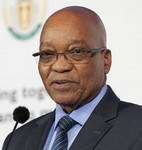
NEWS practitioners should take serious note of Herman Wasserman’s comment that "trust and credibility" underline the relationship between the media and society (Call for media to maintain public trust, September 9).
Wasserman was addressing the 2013 Highway Africa conference, an annual event hosted by Rhodes University’s journalism school. His comment underscores serious concern about the level of professionalism in parts of the media if so-called exposes, such as the "Masibambisane" story, are taken into account.
Masibambisane (Zulu for "let us hold hands") is a nongovernmental organisation (NGO) chaired by President Jacob Zuma, which aims to combat the poverty stalking rural communities. Some government departments have contributed funds to some of its programmes.
Let me declare my personal interest at the outset.
In 1964, I spent three months with Zuma at the Leeuwkop Maximum Prison, which was hell on earth. We were part of a community of about 100 political prisoners. Our section was looked after by a young, vicious warder known as Kriel. He would call one prisoner out into the yard and, believe you me, assault the person nonstop for 10-15 minutes with fists, kicks or his truncheon, which the warders called "die donkie piel" (the donkey’s penis).
On one occasion, after assaulting Ntate Mashamaite, 70, Kriel dragged this old man back to the cell by his feet and Mashamaite’s head kept bumping on the cement yard. Zuma and I also got the treatment but, fortunately, escaped the Mashamaite dessert. Kriel shrieked dementedly, tears streaming down his face, as he hit prisoners until they writhed in pain on the ground. Countless South Africans, black and white, went through such brutalities, some even being hanged, because they wanted, among other things, a free media.
We now have the free media. But do we have a responsible one?
I recall with horror that while I was news editor of The Sowetan in the 1980s, I approved a story that some undertakers sold body parts to businesses for muti. A day later, a crowd in Meadowlands accosted an undertaker, found two bodies in his van, and stoned him to death. I regret this lapse of judgment to this day.
Indeed, the media have a grave responsibility and they must execute this role with aplomb.
After all, the media are the most effective institutions to temper the abuse of power and resources by those in high office. However, no evidence of wrongdoing in the Masibambisane debacle has emerged. Nor is it against any principle of governance for Zuma to be chairman of an NGO. Is it deliberately forgotten that Nelson Mandela was so passionate about the welfare of children that he started many children’s initiatives while he was president? What is wrong with Zuma doing the same, but for rural communities?
There is no denying that Zuma, like other leaders in business and politics all over the world, has erred in some instances and may still err — but not deliberately. However, there is no justification for the total onslaught that appears to portray him and the African National Congress (ANC) as totally unsuitable for government. Molehills become mountains as events and instances are blown out of proportion. This is particularly disconcerting as Masibambisane addresses critical issues such as food security for deprived millions in the rural areas. Fellow South Africans in these areas live in dire poverty. In some areas, unemployment is at a staggering 80%. People go without proper meals for days on end. Do our media care a hoot about the poverty in these areas?
We are all aware of the juniorisation and lack of talent and experience in newsrooms. This has resulted in unsubstantiated gossip taking pride of place as news; an attack-dog style of journalism that also serves as a smokescreen for the mediocrity in some media. This is exactly what Wasserman warns against.
This is what the media must address so that professionalism drives the journalism trade and the interests of society take precedence. Zuma and the ANC expect to be held to account, but let it be on sound, justifiable and professional grounds.
Caption: President Jacob Zuma. Picture: MARTIN RHODES
Article Source: Business Day
Mazwai is resident executive at the Wits Business School and a consultant on small business development.
